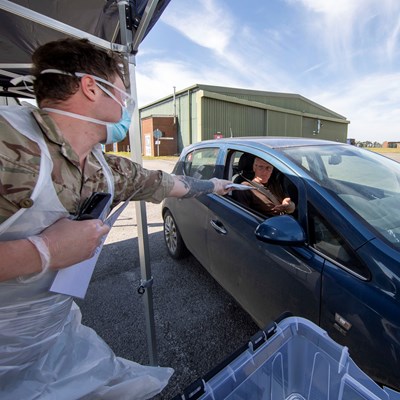PUBLIC health bosses are reminding people how vital it is to self-isolate if they are showing any symptoms of coronavirus.
As the country grapples with a high rate of infections as it approaches the peak time for seasonal flu and other respiratory illnesses, the message to do everything possible to prevent the spread of Covid-19 is more important than ever.
Despite the latest announcement that the first Covid-19 vaccines are expected to begin being rolled out in the UK over the coming weeks and months, staying safe and following public health advice is still vital in the meantime.
Self-isolation is the key to breaking the chain of transmitting the virus, by minimising contact with other people – and it is enforceable by law as part of winning the fight against the pandemic.
People who need to self-isolate include anyone who shows Covid-19 symptoms, or who has tested positive, lives with anyone with symptoms or who tests positive, and anyone who has been told to self-isolate by test and trace, school, or work through being identified as a close contact of someone who is infected.
Self-isolation means not going out of your house or garden – you cannot go to school or work or the shops or go out for your exercise.
You should try and isolate from people that you live with, which is especially important in houses in which lots of people live together. In order to prevent the spread of the virus, you should make sure your house is thoroughly and regularly cleaned.
It’s a good idea to prepared in case you have to self-isolate, for example by setting up online shopping or banking, or making sure you have friends or neighbours who can shop for you or take non-isolating children to and from school.
Leicester’s director of Public Health, Ivan Browne, said: “Self-isolation is a vital tool in getting the city and county’s infection rates under control.
“If you are told to self-isolate, it is very important that you do so, and one of the single most important things that people can do to prevent the spread of this virus.
“We understand that it can be inconvenient and disruptive to isolate and can make life difficult and even unpleasant for a short period of time, but it is nothing like as unpleasant as having to be hospitalised with the virus, or seeing one of your family members suffering with it.
“It is not just about older people either – we are seeing increased infections among younger people, who perhaps thought that they’d be safe, and that these vitally important restrictions don’t apply to them. That isn’t the case – anyone at any age can get coronavirus, and can pass it on to other family members or friends. That is why self-isolating if told to do so is so crucial.
“There are testing centres across the city and county, which will give you a result within a few days of the tests being carried out – that’s the key to making sure people know whether they are ill, what action they need to take.”
Mike Sandys, director of public health for Leicestershire County Council, also echoed his city counterpart’s comments around self-isolating being particularly relevant for young people.
He said: “Young people may only have the mildest of symptoms, but it’s so important they self-isolate so they don’t pass the virus further up the age chain.”
Mr Sandys also said that people self-isolating, particularly those in work, should look to apply for financial support where possible.
- Those unable to get sick pay from their employer might be able to get Statutory Sick Pay (SSP) or another type of financial support;
- People on a low income, who are asked to self-isolate by NHS Test and Trace, may be able to get a £500 support payment by visiting here.
Anyone with symptoms should get a test, which can be done by booking an appointment by calling 119 or here.
A self-isolation checklist is also available here.
Up to date information on how to identify the symptoms of coronavirus, and where to get tested in Leicester, is available at Leicester City Council’s website here.
People wanting help or more information can email Leicester City Council on C19@leicester.gov.uk
For the latest coronavirus updates across the county, visit here.
(Ends)
